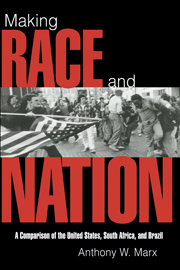Book contents
- Frontmatter
- Contents
- Preface and Acknowledgments
- 1 Introduction
- Part One Historical and Cultural Legacies
- Part Two Racial Domination and the Nation-State
- Part Three Race Making from Below
- 8 “We Are a Rock”
- 9 Burying Jim Crow
- 10 Breaching Brazil's Pact of Silence
- Comparative Overview
- 11 Conclusion
- Notes
- Bibliography
- Index
11 - Conclusion
Published online by Cambridge University Press: 05 June 2012
- Frontmatter
- Contents
- Preface and Acknowledgments
- 1 Introduction
- Part One Historical and Cultural Legacies
- Part Two Racial Domination and the Nation-State
- Part Three Race Making from Below
- 8 “We Are a Rock”
- 9 Burying Jim Crow
- 10 Breaching Brazil's Pact of Silence
- Comparative Overview
- 11 Conclusion
- Notes
- Bibliography
- Index
Summary
State actions were highly consequential in shaping the template of modern race relations. Where and when states enacted formal rules of domination according to racial distinctions, racism was reinforced, whites were unified as whites, challenges from those subordinated eventually emerged, and major racial conflict ensued. Where racial domination was not encoded by the state, issues and conflicts over race were diluted. These dynamics were central to the very different experiences of South Africa, the United States, and Brazil during this century.
Elites encoded racial domination in pursuit of nation-state building, selectively reinforcing earlier prejudice. In South Africa and the United States, blacks were sold out to encourage white unity and nationalist loyalty to the state, precisely because such loyalty was divided. Major intrawhite conflict impelled strong policies to build a coalition, restoring stability and thereby allowing for preservation of the polity and economic growth. Ongoing party and economic conflict brought refinement of ideology and policies toward this end, not in a functionalist manner but as a result of such conflict. Divided white identities were eroded by unifying whites racially as a nation, with elites using the instrument of the state to encourage such unity, and thereby to reinforce the power of the state itself. In contrast, Brazil's early legacy of relatively little intrawhite conflict produced neither an ideology of racism to unify whites nor policies of racial domination to encourage such unity.
- Type
- Chapter
- Information
- Making Race and NationA Comparison of South Africa, the United States, and Brazil, pp. 267 - 278Publisher: Cambridge University PressPrint publication year: 1997

